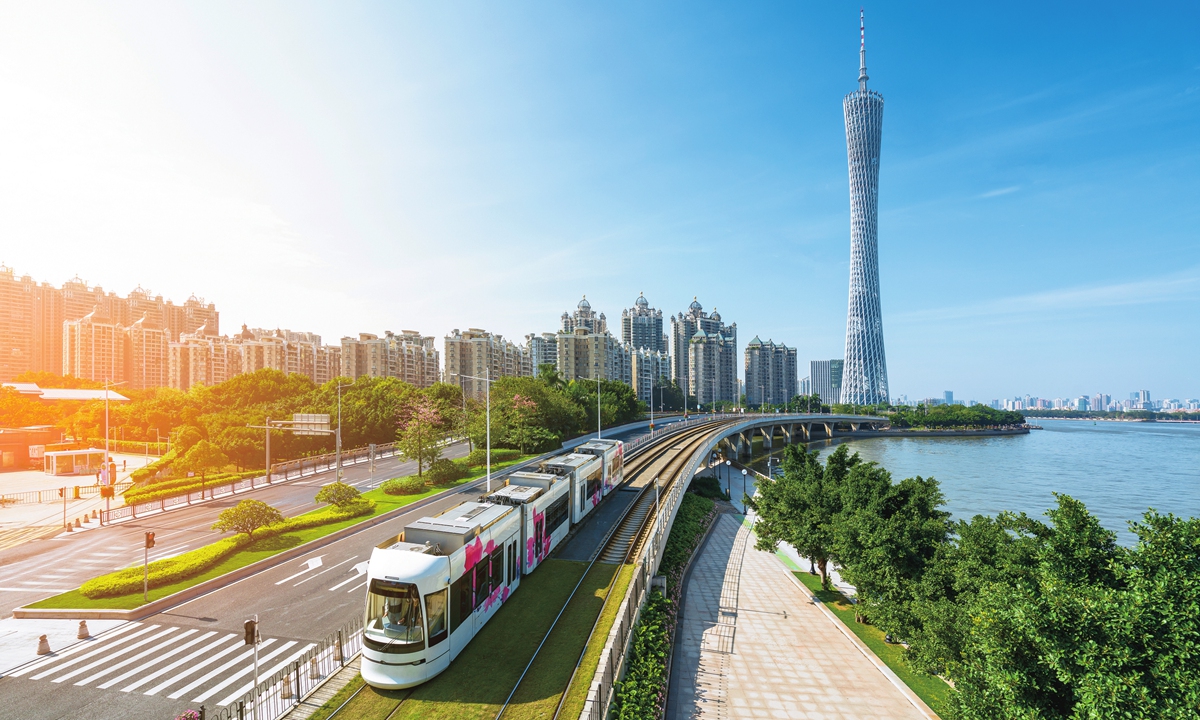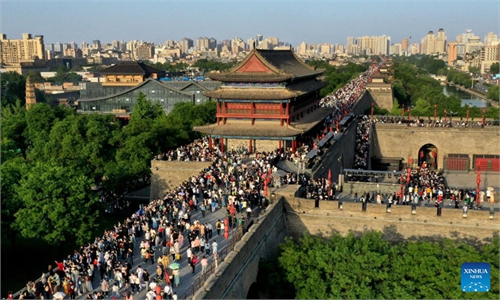China’s rise has yet to peak as it has enormous amount of potential growth: Nobel laureate Michael Spence
Nation's devt shifts to quality growth; green transition to benefit China, entire world


A view of Guangzhou, South China's Guangdong Province Photo: VCG
Editor's Note:
While some Western media outlets recently claimed China's economic recovery from January to April hasn't met their high expectations, a range of economic data actually pointed to a continued and robust recovery. How does China's economic recovery look amid global economic gloom this year? Will the second-largest economy in the world peak as some Western media suggested? Nobel Prize laureate in economics Michael Spence (Spence) on Saturday shared his view and answered some questions (Q) during an interview with the Global Times and other Chinese media at the 2023 Tsinghua PBCSF Global Financial Forum.

Michael Spence Photo: Courtesy of the 2023 Tsinghua PBCSF Global Financial Forum
Q: How do you view China's economic performance in past few months? What are your thoughts on China's post-COVID recovery so far this year?
Spence: The Chinese economic performance in the past few months - the post-COVID period - has been largely as expected and impressive. We all expected a very rapid rebound, and I think we've seen that actually happened.
As it's true in all economies, there are areas of weakness. We have banking problems in the US and the fight on inflation. In China, there are some employment challenges for the younger folks coming into the job market, some imbalances still in the real estate sector and some hope for restoration of bigger investment in the private sector in various sectors. These are manageable problems. China has a long track record of managing the sorts of economic transitions very effectively. On the whole, I think things are going pretty well.
Q: In a recent article, The Economist magazine suggested that China's rise is about to peak. What is your opinion on China's economic potential, resilience and long-term trajectory?
Spence: Normally, The Economist usually makes a fair amount of sense. In this case, I don't agree with it at all.
Everybody understands that China is in the process of becoming a high-income country. Now you're already there in the first-tier municipalities and cities in Beijing, Shanghai, Shenzhen, Hangzhou and so on. But there are large parts of the country in which the journey to high income status is incomplete, in addition to a range of supply side changes that go along with the availability of services, among other factors.
So I think China has an enormous amount of potential growth. I just can't imagine why anybody would think China would suddenly stop at high-middle income status and peak in some sense. So maybe I don't understand something The Economist has insight into, but this doesn't seem to be an accurate prediction at all.
Q: The paradigm of China's economy is shifting to high-quality growth. China's manufacturing industry is upgrading in the global supply chain, and emerging sectors like the green economy are growing rapidly. Can these aspects provide new support for the Chinese economy?
Spence: The short answer is definitely yes. But I think it's important for all to understand that the high-quality growth means essentially advancing a whole range of agendas like sustainability, environmental quality, health and common prosperity. It's a multidimensional exercise and progress.
In that, it's not necessarily going to show up in traditional growth numbers, right? This is an important part of the next decade in the Chinese economy, a kind of balanced approach to economic and social progress.
But I do caution you that you might very well say it's not working because the growth numbers aren't as spectacular as they were before, but that's not a good way to think about it.
A better way to approach it is to look at multiple measures of economic and social progress in areas like the green transition.
But I think China can be advancing on this agenda and it will be beneficial not only to the Chinese residents, but to the rest of the world. The climate change agenda is a spectacular example of that.
I'm not surprised at this stage of China's growth and development, but the agenda has shifted to the quality of growth and I think it's a good thing.
Q: In your opinion, what are the most robust areas for development and the biggest contributors to future economic growth in the world?
Spence: I think that the biggest opportunity to drive growth in the developed economies and the high-middle income economies is a digital transition.
There are other things going on the energy transition, which requires just huge levels of investment on a global basis, and it will continue to drive growth and economic activity in the global economy.
In addition, there's an explosion of entrepreneurial activity, but not all of it is associated with the digital revolution. The energy transition and digital revolution and lifestyle, biomedical and life sciences are all those things that are going to be important.
They're not only important growth drivers, but important drivers of basic changes in the way the global economy is put together in functions. We're in the process of building economies very substantially on digital foundations.
There are still more traditional growth drivers if you think of China's evolution over the last 40 years, the process of modernization, the process of urbanization, and the process of bringing people from the traditional areas of rural areas into the modern economy.
In a fairly large part of the world, probably1-1.5 billion people live in what are now called low-income countries. And if we can remove some of the obstacles to their growth, you could easily imagine a future in which their growth becomes an important driver of global growth, especially if they could succeed in the way that China and a number of other Asian countries have succeeded.

